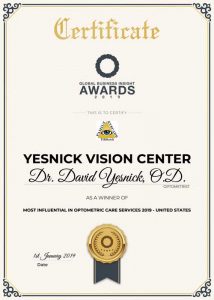Macular degeneration (AMD) is a serious eye disease that impacts the vision of over 1 in 4 people over the age of 75 and almost 50% of those over 85. AMD often results in vision loss, especially if it’s diagnosed in its later stages.
During its early stages, AMD doesn’t present with noticeable symptoms, so by the time blurry vision and blind spots appear, vision loss has already occurred.
Fortunately, foods rich in vitamin B, as well as vitamin B nutritional supplements, may potentially lower a person’s risk of developing AMD, and slow it’s progression.
Our eye doctors explain more below.
What is Macular Degeneration?
Macular degeneration harms your vision by damaging the area in the very middle of the retina, known as the macula, which is responsible for detailed central vision.
Concerned you could have macular degeneration? Book an eye exam with our eye doctors today!
There are two different types of macular degeneration:
Dry macular degeneration:
This is the more common form of the condition, accounting for up to 90% of all AMD, which is usually the result of years, or decades, of a build-up of small deposits of yellowish waste material, called drusen, behind the retina. This gradually damages the macula, causing blurry vision and blind spots in a person’s central vision.
This can cause everyday activities like driving and recognizing faces to become increasingly difficult and even impossible.
Wet macular degeneration:
This form of AMD is much rarer, accounting for up 10% of AMD, but a much more serious form of macular degeneration that occurs when weak new blood vessels form under the macula. These can occur suddenly and these new blood vessels are thin and fragile, which causes them to eventually break, leaking blood and other fluids onto the macula. Damage and swelling from this can quickly become sight-threatening without emergency treatment.
For those looking for a way to reduce their risk, vitamin B6 has been shown to help. One trial showed that a daily supplementation of folic acid, vitamins B6 and B12 reduced the risk of AMD by 40%.
Where to Get Vitamin B6
Several studies suggest that a diet rich in B vitamins, and especially vitamin B6, can significantly reduce your long-term risk of developing macular degeneration.
Vitamin B6 is in food products including:
- Peanuts
- Bananas
- Fatty fish such as salmon
- Turkey
- Chicken
- Soybeans
You can also take multivitamins or stand-alone supplements to add B6 to your diet.
However, before changing your diet or adding supplements, it’s important to consult your family doctor. Additionally, the only way to catch AMD early is by having regular comprehensive eye exams.
Want to learn more about macular degeneration and how vitamin B6 can help?
Visit our Las Vegas eye doctors at Yesnick Vision Center today.
Q&A
Can damage from macular degeneration be reversed?
Unfortunately, damage that occurs before dry macular degeneration is detected or treated cannot be reversed. However, once it’s detected, your eye doctor can take steps to reduce or prevent further damage to your eyes and vision. This is why annual comprehensive eye exams are so important for your ongoing vision and eye health.
Is there any risk to having too much vitamin B6?
Consuming too much vitamin B6 can have a number of effects on the body including numbness, muscle weakness, poor muscle control, feeling imbalanced or dizzy, and sensitivity to touch. Fortunately, it is difficult to ingest too much B6 solely by eating a healthy diet.


